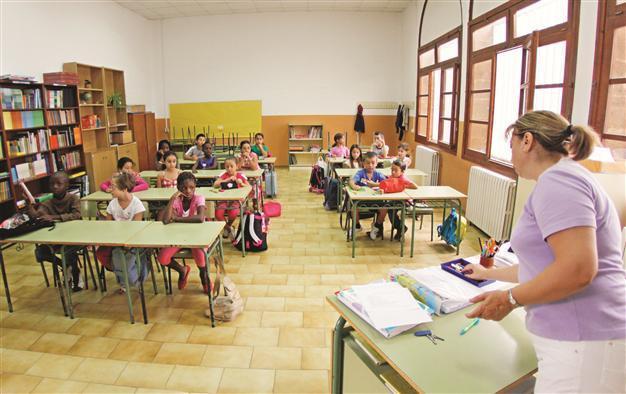Education reform puts Spain, Catalonia on collision course
BARCELONA

Students attend class on their first day back to primary school in the La Soledad public school in Mallorca. The central government has proposed a new education draft that has angered Catalans. REUTERS photo
Tensions between Spain’s Catalonia region and the central government have spilled into the realm of education over a national education reform that targets the sensitive issue of Catalan language teaching in schools. Ties have already been strained over the central government’s austerity measures, fueling separatist sentiments in the region.
Catalonia’s leaders and media were on the defensive after National Education Minister Jose Ignacio Wert proposed an education reform focusing on Spanish language teaching in all regions. Wert proposed removing a requirement that students in Catalonia speak Catalan in their university studies and making the region fund Spanish-language private schooling for children whose parents demanded it.
Defenders of the current system in Catalonia, which aims for complete immersion in the Catalan language, saw the plan as an assault on their cultural identity, which long pre-dates the formation of the modern Spanish state.
The Catalonia regional education counselor Irene Rigau walked out of a meeting with Wert on Dec. 4. “Language is non-negotiable,” she said.
Catalonia’s regional government threatened legal action against the reform. “It could only come from a total ignorance of Catalonia or simply from bad faith,” said the regional government’s spokesman, Frances Homs. “If it is necessary to appeal to the Constitutional Court, we will do so.”
Barcelona adds voiceWert had already drawn criticism for his choice of words in October when he said the conservative Popular Party government in which he serves wanted to “Spanish-ize Catalan pupils.”
He insisted “there is no part of the reform that undervalues the importance of Catalan.”
The current language teaching system “is a successful model,” Josep Maria Cervello, a leader of regional teachers’ union USTEC, said. “Even UNESCO and the EU cite it as a non-discriminatory system that gives everyone the opportunity to be competent in the official languages,” Spanish and Catalan, both of which are widely used, he said. Long a symbol of Catalan identity, Barcelona soccer club added its voice to the simmering political dispute.
“Our language, like our club, is an element of integration that permits us to identify with our country [Catalonia],” the club said, adding that it “energetically asserts its right to use the Catalan language and the model of language immersion that has been in force in Catalonia over the last 34 years.”
The statement also comes at a politically sensitive time for Spain. A financial crisis has left the country on the verge of requesting an international bailout, and the government has been forced to pass unpopular austerity measures.
This has fueled long-simmering separatist sentiments in Catalonia, where many believe the region can thrive if it breaks away from Spain and becomes an independent nation within the European Union.
That notion was put to the test in Catalonia’s regional parliamentary elections last month, in which the central issue was whether to hold a referendum on separating from Spain. Pro-referendum voters obtained a majority of seats in the legislature.
The proposed referendum has caused tension with the central government, led by Prime Minister Mariano Rajoy, which maintains that it would be unconstitutional for Spain’s regions to hold individual referendums.
